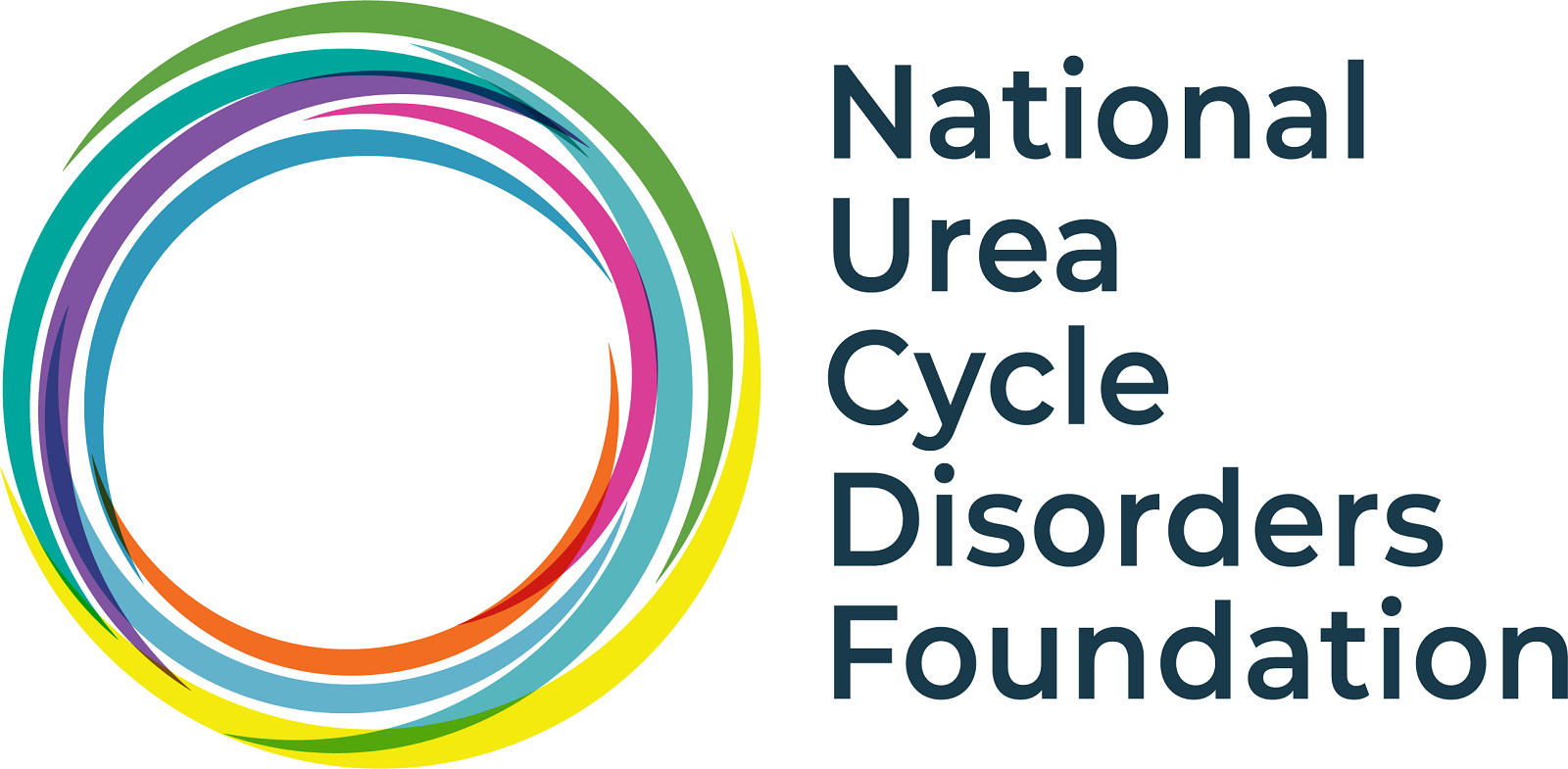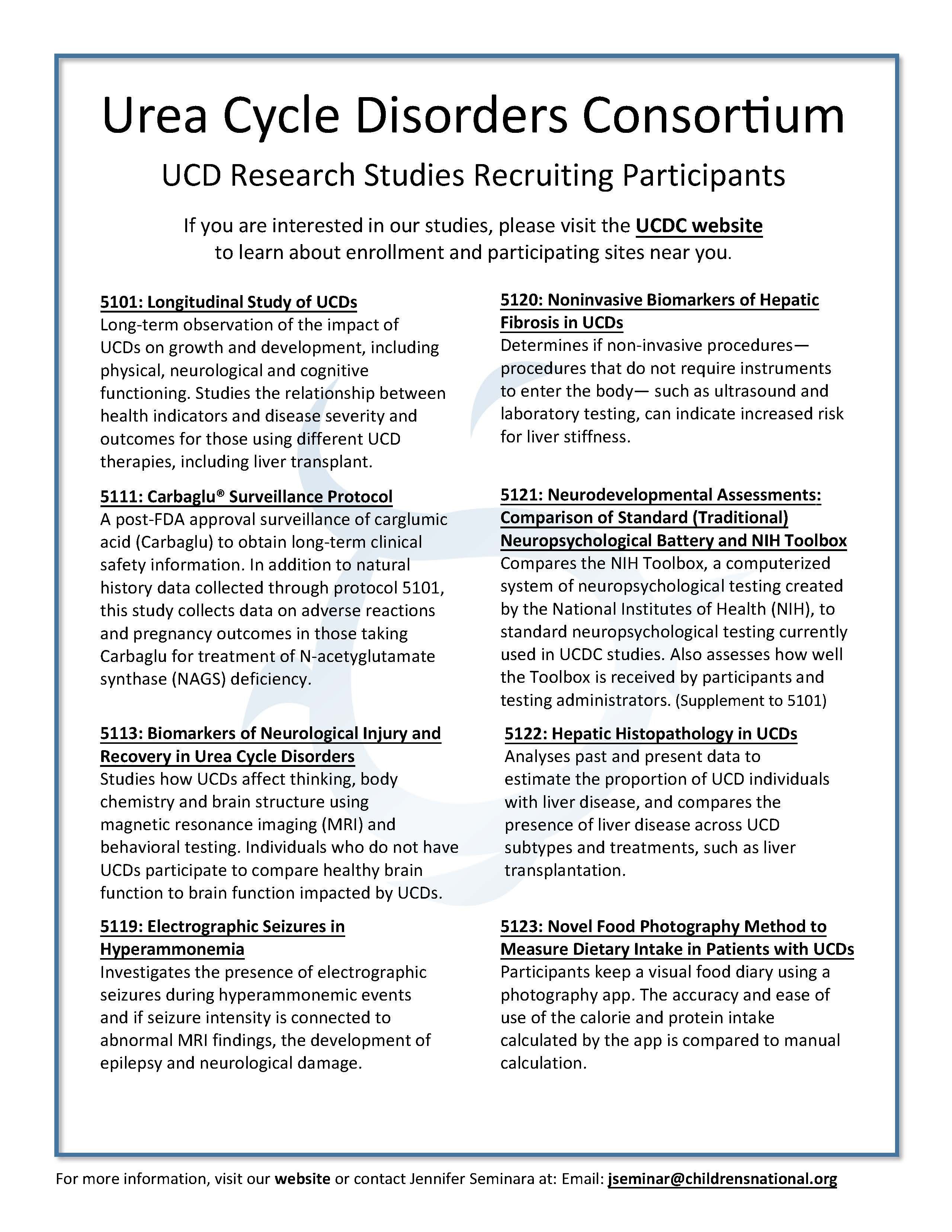
In 2003, the National Institutes of Health (NIH) developed the pioneering Rare Diseases Clinical Research Network (RDCRN) in order to promote and fund collaborative research on rare diseases. To answer this call, the Urea Cycle Disorders Consortium (UCDC), comprised of 5 academic centers, and led by Dr. Mark L. Batshaw of Children’s National Medical Center, was founded with the collaboration of the National Urea Cycle Disorders Foundation. The UCDC was awarded its first 5-year grant by NIH-RDCRN to study urea cycle disorders. Only 11 rare disease consortiums received this prestigious award. Five years later, in 2008, the RDCRN offered another round of funding to rare diseases researchers through a highly competitive grant process. The UCDC applied, received the highest score of all applications, and was awarded another 5-year grant to continue UCD research. In 2014, UCDC received its fourth consecutive award, attaining a perfect score of 10 on the grant review, and in 2019, the UCDC received a fifth consecutive funding award. Additional funding is being provided by matching grants from private family foundations. The National Urea Cycle Disorders Foundation provides funding for neuroimaging studies at the Georgetown University site, and funds 2 additional research centers at Stanford University Lucile Packard Children's Hospital and the University of California San Francisco.
The purpose of the UCDC is to perform cutting-edge research to improve the understanding of UCD and to accelerate new treatments. The UCDC includes teams of doctors, nurses, research coordinators and research laboratories at 14 academic centers in the US, Canada and Europe working together and in close collaboration with the National Urea Cycle Disorders Foundation. One of the key roles the Foundation plays is ensuring the needs and wishes of UCD patients and families are met as we strive to improve their lives and learn more about preventing the effects of urea cycle disorders.
"The collaboration has provided a unique environment which has led to discoveries that have improved outcome for affected patients that we could have only dreamed about before the Rare Disease Clinical Research Network came into being," says Dr. Batshaw. Rare diseases affect over 25 million Americans, but only a handful have any treatments available. Since 2003, the UCDC and NUCDF have assisted in the development and FDA approval of three new drugs to treat urea cycle disorders by bringing together stakeholders, developing clinical trial protocols, and conducting clinical trials at the UCDC sites. The UCDC collaboration now extends internationally to include the inborn error of metabolism researcher groups in Japan, Australia, and Europe.
Many patients and families with urea cycle disorders struggle to obtain an accurate diagnosis and access life-saving treatment. The UCDC sites are "centers of excellence" for diagnosis, treatment and monitoring, and have improved both identification and outcomes for patients.
Dr. Tuchman stated that "the creation and funding of the UCDC has been the culmination of many years of clinical and research work...patients with UCD now have new hopes for a better future as a result of the projects conducted by the UCDC." The UCDC has helped develop newborn screening technology to improve diagnosis, and conducts research on brain function using advanced neuroimaging techniques at the Georgetown site (Dr. Andrea Gropman). These neuroimaging techniques are unlocking the mysteries of the effects of UCD on brain function and are the foundation for developing new treatments to prevent these devastating effects.
The UCDC also trains the next generation of clinicians and researchers, and provides education on UCDs to healthcare professionals and the public through its partnership with the National Urea Cycle Disorders Foundation.
UCDC Principal Investigators:
Lead Principal Investigators
Andrea Gropman, M.D., St. Jude Children's Research Hospital
Sandesh Nagamani, M.D., Baylor College of Medicine
Cynthia Le Mons, National Urea Cycle Disorders Foundation
UCDC Research Centers and Site Investigators:
- Ann & Robert H. Lurie Children's Hospital of Chicago
- Children’s National Medical Center, Washington, D.C. (Nicholas Ah-Mew, M.D.)
- Children’s Hospital of Philadelphia, PA (Marc Yudkoff, M.D)
- Baylor College of Medicine (Sandesh Nagamani, MD., Brendan Lee, M.D., Ph.D.)
- University of Minnesota Amplatz Children's Hospital (Susan Berry, M.D.)
- University of California at Los Angeles (UCLA), CA (Derek Wong, M.D.)
- Icahn School of Medicine/Mount Sinai, New York, NY (George Diaz, M.D.)
- Rainbow and Babies Hospital, Cleveland, OH (Jirair Bedoyan, M.D., Ph.D.)
- Children's Hospital of Boston/Harvard, Boston, MA (Gerald Berry, M.D.)
- Oregon Health & Science University, Portland, OR (Cary Harding, M.D.)
- Seattle Children's Hospital, Seattle, WA (J. Lawrence Merritt, M.D.)
- Children's Hospital Colorado, Aurora, CO (Shawn McCandless, M.D.)
- University of California, San Francisco, CA(Renata Gallagher, M.D.)
- Stanford Lucile Packard Children's Hospital, Palo Alto, CA (Gregory Enns, M.D.)
- Hospital for Sick Children, Toronto, Canada (Andres Schulze, M.D.)
- University Children's Hospital, Zurich, Switzerland (Mattias Baumgartner, M.D., Tamar Stricker, M.D.)
- Centre for Pediatric and Adolescent Medicine, Heidelberg, Germany (Georg Hoffman, M.D., Stephan Kolker, M.D.)
PARTICIPATING IN UCD Consortium RESEARCH
STUDIES OPEN FOR ENROLLMENT
Longitudinal Study of Urea Cycle Disorders: The goal of the Longitudinal Study is to improve the treatment and overall health of persons with UCD by collecting information on the growth, development and outcomes of the study participants over time. Participation in this study is critical; the more information that is collected, the better we will be able to understand the disorders, how they affect patients and families, and how treatment and short and long-term outcomes can be improved. The Longitudinal Study is making it possible to determine:
- How effective are the different treatments and diets that are currently in use, and are there better treatments that could be used?
- What are the triggers that lead to hyperammonemia and subsequent hospital stays?
- Which of the biochemical laboratory tests commonly ordered during a metabolic clinic visit are the best at determining the severity of the urea cycle disorder?
- How common are hyperammonemic episodes, developmental disabilities and various other long-term health concerns for people with UCD?
- How common are the different UCDs in the general population (incidence and prevalence)?
- How do persons with UCD and family members cope with the disease and how can their physicians improve the coping process?
How To Participate:
First, enroll in the UCDC Contact Registry, or contact the research coordinator at the UCDC research center nearest to you (request latest contact information here). The coordinator will make sure that the potential participant is eligible for the study. Once eligibility is confirmed, the individual will be asked to visit the UCDC research center for an initial study visit. Travel expenses are covered by the study. Follow-up visits are arranged at the participant’s local metabolic physician’s office if possible. Participants return to the UCDC center for a study visit every to six or twelve months, depending on age. Study visits are very similar to any regular metabolic clinic visit. Participants and their families are asked to provide information about the participant’s medical history and family history. A physical examination is performed and blood and urine collected for standard biochemical studies. Parents or patients are asked to complete a brief questionnaire about how their daily life is going. Participants undergo neuropsychological testing at specific intervals according to age. This testing is used to identify differences in how a person’s brain processes information and learns. Some of these processes include problem solving, how well language is expressed or understood, memory and attention, and brain's ability to plan and organize (called "executive function"). This information assists researchers in understanding the effects of UCD on brain function and in developing new treatments and therapies to improve the lives of patients.
Neuroimaging Studies - Mechanisms of Brain Injury in Inborn Errors of Metabolism: Many inborn errors of metabolism, including urea cycle disorders, are associated with irreversible brain injury. It is not clear how metabolite intoxication or depletion of substrates accounts for the specific cognitive and neurologic findings observed in patients with UCDs. Neuroimaging is a powerful diagnostic and research tool which can provide information about the timing, extent, reversibility, and possible mechanism of neural injury in a non-invasive manner. The goal of the study is to use advances in neuroimaging (MRI, fMRI, MRS) to improve understanding of underlying neural mechanisms that contribute to cognitive, pathologic (white matter disturbances). To date, the neuroimaging study has made it possible to detect metabolic and structural abnormalities in the brains of individuals with OTC deficiency by evaluating heterozygous female carriers and late onset males. This research focuses on on:
- Ammonia, a well recognized neurotoxin, and the manner in which it exerts effects on the central nervous system (CNS).
- Effects of acute versus chronic hyperammonemia at the cell and neurocircuitry level.
- Role of glutamine in hyperammonemic encephalopathy (rise in plasma glutamine levels preceding hyperammonemia; difference between plasma levels and CNS levels; why is glutamine chronically elevated in brain even with normal ammonia levels).
- Determine patterns of neuroanatomic damage in OTCD, and examine neural mechanism of cognitive and motor system abnormalities.
For more information or questions regarding any of the studies,
contact NUCDF Study Info.
More About Clinical Trials

